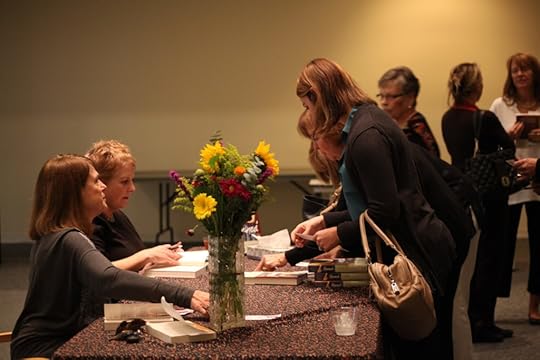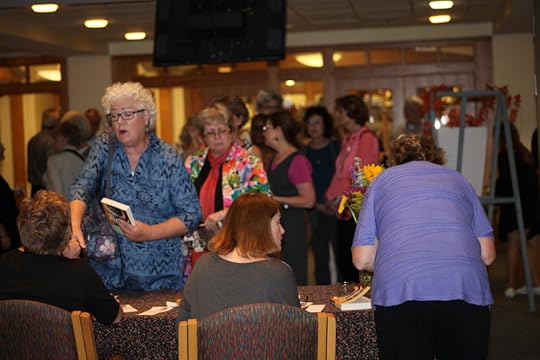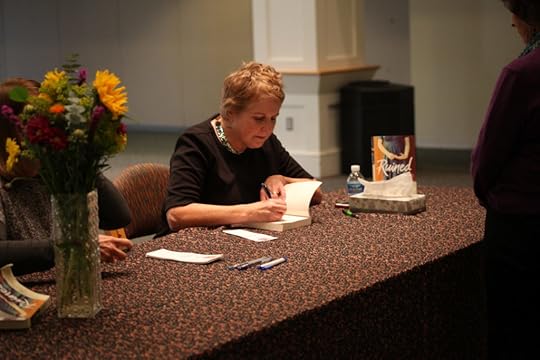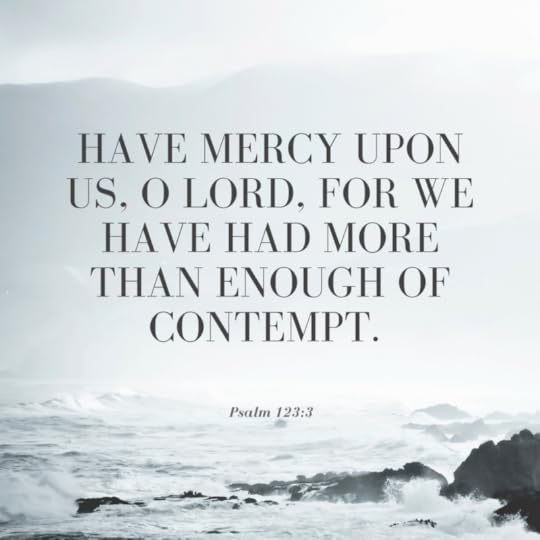Ruth Everhart's Blog, page 17
November 22, 2016
Facebook Offer — Personalized & Signed Books!
2 books (either title) plus 2 art cards for $30, free shipping
Hello Readers!
Books make great gifts, so I’m offering a special price on two books now through December 3.
You can get any two books for $30. (Well, books that I wrote, anyway.) Choose one of each title, or two of the same title. I will personalize, inscribe and sign the title page of each book (see below), put them in a padded mailer along with two art cards, and mail them.
To_______, because we are all more than what happened to us.
Ruth Everhart, today’s date
To_______, with blessings on your pilgrim path.
Ruth Everhart, today’s date
I can gift wrap the books ($6 each) and send them straight to the lucky recipient. Feel free to split the order — an additional postal address will cost $4.
Orders must be received by Saturday, Dec. 3.
I’m working on the Paypal Invoice — check back tomorrow! Also my daughter is busy designing the cards. I’ll load a picture when we get it all perfect.
.huge-it-share-buttons {
border:0px solid #0FB5D6;
border-radius:5px;
text-align:right; }
#huge-it-share-buttons-top {margin-bottom:0px;}
#huge-it-share-buttons-bottom {margin-top:0px;}
.huge-it-share-buttons h3 {
font-size:25px ;
font-family:Arial,Helvetica Neue,Helvetica,sans-serif;
color:#666666;
display:block; line-height:25px ;
text-align:right; }
.huge-it-share-buttons ul {
float:right; }
.huge-it-share-buttons ul li {
margin-left:3px !important;
margin-right:3px !important;
padding:0px;
border:0px ridge #E6354C;
border-radius:11px;
background-color:#14CC9B;
width:auto !important;
}
.huge-it-share-buttons ul li #backforunical8784 {
border-bottom: 0;
background-image:url('http://www.rutheverhart.com/wp-conten...
width:30px;
height:30px;
}
Share This:
The post Facebook Offer — Personalized & Signed Books! appeared first on Ruth Everhart.
November 16, 2016
“BIRTHED: Finding Grace through Infertility”
a memoir about infertility that will be a blessing to you
 Do you know someone who is struggling with infertility? Perhaps this is the story you live, but hide from others. Or perhaps you have a different but similar sort of heartache. Do you know the feelings of repeated loss and grief, which bring a sense of hopelessness?
Do you know someone who is struggling with infertility? Perhaps this is the story you live, but hide from others. Or perhaps you have a different but similar sort of heartache. Do you know the feelings of repeated loss and grief, which bring a sense of hopelessness?
My friend Elizabeth Hagan has just written a memoir about her experience with infertility. I am so pleased to tell you about her book — for two reasons. I have been privileged to know Elizabeth while she lived this story, and while she wrote this story — an experience that has covered nearly a decade! I can tell you that Elizabeth is a woman who lives with integrity and passion, and every word of this book reflects her experience of living as a follower of Jesus while her heart was breaking. There is nothing forced or false about any of these sentences. I can also tell you that Elizabeth has grown so much as a writer over that decade! What she has achieved in getting these words onto the page is truly remarkable.
I urge you to buy and read her book! You know someone who needs this book.
Here are some of hard-won lessons you will glean from sharing Elizabeth’s journey:
~ When life doesn’t go as you plan, something greater might be emerging beneath the surface. Live through the pain and you will get there!
~ There are no “one-size” fits all answers to a fertility journey, medically, emotionally or spiritually.
~ It is okay to live into the mystery — the mystery of not knowing how you will bear a child, when or if at all.
~ Infertility does not have to be a silent journey. Connect with my story. Connect to others who’ve gone through it too. Let friends and family who can bear with your pain love you through it.
~ A long season of grief doesn’t have to destroy your marriage or friendships. It can in fact bring you closer.
Learn more at Elizabeth’s website, Preacher on the Plaza.
.huge-it-share-buttons {
border:0px solid #0FB5D6;
border-radius:5px;
text-align:right; }
#huge-it-share-buttons-top {margin-bottom:0px;}
#huge-it-share-buttons-bottom {margin-top:0px;}
.huge-it-share-buttons h3 {
font-size:25px ;
font-family:Arial,Helvetica Neue,Helvetica,sans-serif;
color:#666666;
display:block; line-height:25px ;
text-align:right; }
.huge-it-share-buttons ul {
float:right; }
.huge-it-share-buttons ul li {
margin-left:3px !important;
margin-right:3px !important;
padding:0px;
border:0px ridge #E6354C;
border-radius:11px;
background-color:#14CC9B;
width:auto !important;
}
.huge-it-share-buttons ul li #backforunical8775 {
border-bottom: 0;
background-image:url('http://www.rutheverhart.com/wp-conten...
width:30px;
height:30px;
}
Share This:
The post “BIRTHED: Finding Grace through Infertility” appeared first on Ruth Everhart.
November 9, 2016
We Are More Than What Happens To Us
a collective response to trauma
I recently wrote a memoir about recovering from trauma. The tagline was: “You are more than what happened to you.” My premise was that for me, a key component in recovering from trauma was to assume agency over my own life.
Today it appears that America has experienced a collective trauma. It is no less painful for being self-inflicted. We have elected as our next President an ill-prepared man who disregards the rights of others. From what I understand, he was elected in response to two factors — pervasive feelings of disenfranchisement on the part of many white people who are experiencing job loss and wage stagnation, and evangelical voters who place primacy emphasis on the appointment of conservative justices in order to address the issue of abortion.
I have fears about this new president. Many fears. I want to resist the scenarios that crowd into my mind: human rights rolled back, misogyny flourishing, whole financial sectors bankrupted, the natural world destroyed for profit, nations warring with previously harnessed powers now in play.
If I apply what I learned during my own trauma and recovery, I know we must wrestle to regain agency over the parts of our common life that we can still control. This could span a plethora of things. For example, can we:
begin to understand the disenfranchisement of some whites who are not making it financially
resist fear and hatred of the Other, no matter who that Other might be — by race, gender or creed
fight against misogyny and support the full humanity of women and their bodies
make an effort to appreciate the fervor of those who support “sanctity of life” issues
stand with immigrants in this nation of immigrants
uphold the newly-won rights of our gay sisters and brothers
protect Muslim friends and neighbors in this nation which espouses freedom of religion
partner with people of color in a land once shackled by Jim Crow
fight to protect our one and only planet as climate continues to change
What would you add? Which tasks call to you? Do they seem mutually exclusive? The task(s) to which you could devote the next four years might be on this list.
Be bold. Be strong and courageous. We are more than what happened to us. We are more than our worst collective decisions.
.huge-it-share-buttons {
border:0px solid #0FB5D6;
border-radius:5px;
text-align:right; }
#huge-it-share-buttons-top {margin-bottom:0px;}
#huge-it-share-buttons-bottom {margin-top:0px;}
.huge-it-share-buttons h3 {
font-size:25px ;
font-family:Arial,Helvetica Neue,Helvetica,sans-serif;
color:#666666;
display:block; line-height:25px ;
text-align:right; }
.huge-it-share-buttons ul {
float:right; }
.huge-it-share-buttons ul li {
margin-left:3px !important;
margin-right:3px !important;
padding:0px;
border:0px ridge #E6354C;
border-radius:11px;
background-color:#14CC9B;
width:auto !important;
}
.huge-it-share-buttons ul li #backforunical8747 {
border-bottom: 0;
background-image:url('http://www.rutheverhart.com/wp-conten...
width:30px;
height:30px;
}
Share This:
The post We Are More Than What Happens To Us appeared first on Ruth Everhart.
November 3, 2016
Confronting Contempt
Blood & Flab & Lactation, Oh My!
This nasty political season has gone on so long that I am embracing nastiness. Ever since Donald Trump called Hillary Clinton “nasty” during the third presidential debate, many feminists have embraced the word. I get it. As a member of a group that’s both feisty and downtrodden, I appreciate the strategy of “steering into the insult.” I laughed at the meme that said, “That’s Reverend Nasty Woman to you!”
Yet I see dangers in trivializing “nasty” and ignoring what the insult represents. “Nasty” encapsulates Trump’s attitude toward women in particular, along with other “disgusting” categories of humans— notably immigrants, Muslims, news media, Mexicans, other politicians.
Disgust is Trump’s favorite flavor. We’ve seen him sprinkle it everywhere. And why not? Disgust is an all-purpose seasoning, It packs a punch. Plus, it pairs well with Trump’s favorite wine — anger. The combination of the two is contempt. We all know contempt when we see it — a curled lip.
Contempt is powerful. And convenient. And common. You could almost forget that it’s fundamentally unChristian. To regard another person with contempt is to refuse to see the image of God in them. A curled lip indicates the belief that the Other is worth less. Yet the Bible teaches us to look on the Other with love. We are to gaze upon the face of the hungry, the thirsty, the naked, the stranger, the sick, the imprisoned — and see Jesus.
Contempt does not want to gaze upon others with the eyes of Christ. To do so is inconvenient and costly. So why bother? Instead, contempt expresses an attitude that scripture expressly condemns — quick judgment and easy hostility. Jesus did not condone contempt. When the scribes and Pharisees famously wanted to stone a woman who was caught in adultery, Jesus refused, writing his reasons on the sand. (John 8) Jesus’ message was immediately lost because, presumably, every generation must ferret out this difficult lesson for themselves.
If you’re a woman you know contempt from the inside out, even if you don’t use the word. As we’ve been reminded lately, female bodies bleed from “where-ever.” Not only that, female bellies grow great with baby, then become empty pockets. Female breasts drip milk. Female bodies get used — and used up — in ways that male bodies do not. All of this is not sexy, apparently. To some people it is disgusting, even angry-making. Remember that disgust plus anger equals contempt. There you have it. All it takes to be worthy of contempt is to inhabit a woman’s skin.
Blood and flab and lactation, oh my! No matter that these biological realities preserve our species. No matter that our faith tradition proclaims a deity who was born from a woman’s body. No matter that Jesus wore flesh, allowed women to touch him, and paid special attention to the “disgusting” and marginalized persons he encountered — the Samaritan, the tax collector, the leper.
If the church wants to confront the problem of contempt — rather than continue to participate in it — there are two underlying religious messages it must expose. First is the idolization of purity. Second is the fear of contamination. Both of these messages — which we’ve seen play out on the political stage — are profoundly religious concepts.
Any scripture reader can tell you about purity and contamination. A theme throughout the scriptures is what it means to be set apart, or chosen, and worthy of approach to a holy God. Historically this has had special implications for women, whose messy bodies have been managed by men with all kinds of complicated rituals. Here’s a fun discussion question: What do the Levitical taboos about menstruation have in common with the current day “purity balls” where daughters pledge their purity to their fathers?
Books have been written on the subject, but the assumption lying underneath all this is straightforward: women are not only different from men, but worth less than men. The word for this is misogyny. Misogyny puts women in a double bind from which there is no escape.
Consider the “nasty woman” comment again. The insult came when Hillary Clinton was confidently answering a policy question about entitlement reform. To many people, the insult needed no further explanation or clarification. It was hurled and it stuck. She was a woman speaking her mind, therefore she was nasty. There is no way out of this bind. Hence the feminist embrace of the word.
As a faith leader I find it painful to admit this, but religion often reinforces the double bind. Religious people like to speak about honoring women, but what that looks like is problematic. Religion would rather place women on unhelpful pedestals than work side-by-side or — heavens-to-Betsy — cultivate female leadership!
Instead, women are treated as window dressing, shut down as soon as they want an equal place at the table. Issues like sexual violence are termed “women’s issues” and given secondary priority. Women are still told to smile more, and to weigh less. Yes, still.
Churches should recognize the problem of contempt, and admit their own complicity. I call upon churches everywhere to follow Jesus. Embrace the message of incarnation. Expose contempt for what it is.
Have mercy upon us, O Lord, have mercy upon us, for we have had more than enough of contempt. Our soul has had more than its fill of the scorn of those who are at ease, of the contempt of the proud. ~ Psalm 123:3-4
.huge-it-share-buttons {
border:0px solid #0FB5D6;
border-radius:5px;
text-align:right; }
#huge-it-share-buttons-top {margin-bottom:0px;}
#huge-it-share-buttons-bottom {margin-top:0px;}
.huge-it-share-buttons h3 {
font-size:25px ;
font-family:Arial,Helvetica Neue,Helvetica,sans-serif;
color:#666666;
display:block; line-height:25px ;
text-align:right; }
.huge-it-share-buttons ul {
float:right; }
.huge-it-share-buttons ul li {
margin-left:3px !important;
margin-right:3px !important;
padding:0px;
border:0px ridge #E6354C;
border-radius:11px;
background-color:#14CC9B;
width:auto !important;
}
.huge-it-share-buttons ul li #backforunical8736 {
border-bottom: 0;
background-image:url('http://www.rutheverhart.com/wp-conten...
width:30px;
height:30px;
}
Share This:
The post Confronting Contempt appeared first on Ruth Everhart.
That’s Reverend Nasty Woman to You!
Confronting the Problem of Contempt
This nasty political season has gone on so long that I am embracing nastiness. Ever since Donald Trump called Hillary Clinton “nasty” during the third presidential debate, many feminists have embraced the word. You can buy “Nasty Woman” buttons and mugs. I get it. As a member of a group that’s both feisty and downtrodden, I appreciate the strategy of “steering into the insult.” I laughed at the meme that said, “That’s Reverend Nasty Woman to you!”
Yet I see dangers in trivializing “nasty” and ignoring what the insult represents. This was not a humorous jibe, carelessly flung in a moment of irritation. “Nasty” encapsulates Trump’s attitude toward women in particular, along with other “disgusting” categories of humans— notably immigrants, Muslims, news media, Mexicans, other politicians.
Disgust is Trump’s favorite flavor. We’ve seen him sprinkle it everywhere. And why not? Disgust is an all-purpose seasoning, It packs a punch. Plus, it pairs well with Trump’s favorite wine — anger. The combination of the two is contempt. We all know contempt when we see it — a curled lip.
Contempt is powerful. And convenient. And common. You could almost forget that it’s fundamentally unChristian. To regard another person with contempt is to refuse to see the image of God in them. A curled lip indicates the belief that the Other is worth less. Yet the Bible teaches us to look on the Other with love. We are to gaze upon the face of the hungry, the thirsty, the naked, the stranger, the sick, the imprisoned — and see Jesus.
Contempt does not want to do that. Gazing at others and seeing Jesus is inconvenient and costly. So why bother? Instead, contempt expresses an attitude that scripture expressly condemns — quick judgment and easy hostility. Jesus did not condone contempt. When the scribes and Pharisees famously wanted to stone a woman who was caught in adultery, Jesus refused, writing his reasons on the sand. (John 8) Jesus’ message was immediately lost because, presumably, every generation must ferret out this difficult lesson for themselves.
If you’re a woman you know contempt from the inside out, even if you don’t use the word. As we’ve been reminded lately, female bodies bleed from “where-ever.” Not only that, female bellies grow great with baby, then become empty pockets. Female breasts drip milk. Female bodies get used — and used up — in ways that male bodies do not. All of this is not sexy, apparently. To some people it is disgusting, even angry-making. Remember that disgust plus anger equals contempt. There you have it. All it takes to be worthy of contempt is to inhabit a woman’s skin.
Blood and flab and lactation, oh my! No matter that these biological realities preserve our species. No matter that our faith tradition proclaims a deity who was born from a woman’s body. No matter that Jesus wore flesh, allowed women to touch him, and paid special attention to the “disgusting” and marginalized persons he encountered — the Samaritan, the tax collector, the leper.
If the church wants to confront the problem of contempt — rather than continue to participate in it — there are two underlying religious messages it must expose. First is the idolization of purity. Second is the fear of contamination. Both of these messages — which we’ve seen play out on the political stage — are profoundly religious concepts.
Any scripture reader can tell you about purity and contamination. A theme throughout the scriptures is what it means to be set apart, or chosen, and worthy of approach to a holy God. Historically this has had special implications for women, whose messy bodies have been managed by men with all kinds of complicated rituals. Here’s a fun discussion question: What do the Levitical taboos about menstruation have in common with the current day “purity balls” where daughters pledge their purity to their fathers?
Books have been written on the subject, but the assumption lying underneath all this is straightforward: women are not only different from men, but worth less than men. The word for this is misogyny. Misogyny puts women in a double bind from which there is no escape.
Consider the “nasty woman” comment again. The insult came when Hillary Clinton was confidently answering a policy question about entitlement reform. To many people, the insult needed no further explanation or clarification. It was hurled and it stuck. She was a woman speaking her mind, therefore she was nasty. There is no way out of this bind. Hence the feminist embrace of the word.
As a faith leader I find it painful to admit this, but religion often reinforces the double bind. Religious people like to speak about honoring women, but what that looks like is problematic. Religion would rather place women on unhelpful pedestals than work side-by-side or — heavens-to-Betsy — cultivate female leadership!
Instead, women are treated as window dressing, shut down as soon as they want an equal place at the table. Issues like sexual violence are termed “women’s issues” and given secondary priority. Women are still told to smile more, and to weigh less. Yes, still.
Churches should recognize the problem of contempt, and admit their own complicity. I call upon churches everywhere to follow Jesus. Embrace the message of incarnation. Expose contempt for what it is.
Have mercy upon us, O Lord, have mercy upon us, for we have had more than enough of contempt. Our soul has had more than its fill of the scorn of those who are at ease, of the contempt of the proud. ~ Psalm 123:3-4
.huge-it-share-buttons {
border:0px solid #0FB5D6;
border-radius:5px;
text-align:right; }
#huge-it-share-buttons-top {margin-bottom:0px;}
#huge-it-share-buttons-bottom {margin-top:0px;}
.huge-it-share-buttons h3 {
font-size:25px ;
font-family:Arial,Helvetica Neue,Helvetica,sans-serif;
color:#666666;
display:block; line-height:25px ;
text-align:right; }
.huge-it-share-buttons ul {
float:right; }
.huge-it-share-buttons ul li {
margin-left:3px !important;
margin-right:3px !important;
padding:0px;
border:0px ridge #E6354C;
border-radius:11px;
background-color:#14CC9B;
width:auto !important;
}
.huge-it-share-buttons ul li #backforunical8736 {
border-bottom: 0;
background-image:url('http://www.rutheverhart.com/wp-conten...
width:30px;
height:30px;
}
Share This:
The post That’s Reverend Nasty Woman to You! appeared first on Ruth Everhart.
October 31, 2016
Vicious Rape, Unstoppable Redemption
photos from an event at Vienna Presbyterian Church
On Sunday, Oct 30, the saints at Vienna Presbyterian Church hosted an author event called Vicious Rape, Unstoppable Redemption. I am so grateful to everyone who put their heart and soul into this event, especially Sue Hamblen, the Director of Missions, and Sally Mitchell, the Bookstore Manager, and all the people who assisted them. It was a lovely event with a worship component, since the praise band Work in Progress played to open and close — a special treat. Afterward there was a book signing and refreshments in the Great Hall (with homemade cookies — thanks to Gerri Webb and her elves!).
If you’re in northern Virginia and need a book, stop by the Grapevine Bookstore (open Sun, Tues, Thurs) and say hello to Sally and the rest of the crew.
I’ll post a few photos from last night — thanks to Megan Kritsky for the pics!

Work in Progress playing.

Reading a few paragraphs from the Epilogue.

Sexual violence is a heavy topic, but there were many lighthearted moments.

Having multiple copies signed for friends, God bless this reader!

That’s my good friend Ginni Richards beside me at the book signing table.

The many hands that made it all look easy! Sally is in purple, Gerri is holding my book, and Sue is in plaid.

I’ve been told I need a “book signing pic” so here it is. I like to write: “You are more than what happened to you.”
.huge-it-share-buttons {
border:0px solid #0FB5D6;
border-radius:5px;
text-align:right; }
#huge-it-share-buttons-top {margin-bottom:0px;}
#huge-it-share-buttons-bottom {margin-top:0px;}
.huge-it-share-buttons h3 {
font-size:25px ;
font-family:Arial,Helvetica Neue,Helvetica,sans-serif;
color:#666666;
display:block; line-height:25px ;
text-align:right; }
.huge-it-share-buttons ul {
float:right; }
.huge-it-share-buttons ul li {
margin-left:3px !important;
margin-right:3px !important;
padding:0px;
border:0px ridge #E6354C;
border-radius:11px;
background-color:#14CC9B;
width:auto !important;
}
.huge-it-share-buttons ul li #backforunical8718 {
border-bottom: 0;
background-image:url('http://www.rutheverhart.com/wp-conten...
width:30px;
height:30px;
}
Share This:
The post Vicious Rape, Unstoppable Redemption appeared first on Ruth Everhart.
October 24, 2016
Exercising Self-Care After Sexual Assault
Victims May Need to Pace Themselves
Last week a pastor friend hosted a book event for RUINED. Her approach: “Since the subject is so hard we should make sure it’s fun.” She arranged to have the event in the back room of a local tapas restaurant and advertised it as a happy hour.
In the minutes before the event began, as she and I munched chips and salsa, she told me: “Ruth, don’t be disappointed if attendance is slim. I sent special emails to so many women! I was sure they would want to be here — and so many of them said, I’m sorry but I just can’t. I can’t think about this subject.”
I understand why women might not want to attend. Perhaps they have been victims of sexual assault, or have their own difficult stories. I want to believe that reading my book, or discussing it, would be beneficial, but I respect their need to protect themselves. Perhaps this is especially true lately, when the media has been so saturated with stories of sexual assault. All the violent language and coarseness of news accounts can be very triggering.
The 15 or so women who did attend had a lively discussion. What a lovely event! Thanks to my host, the Reverend Debbie Parsons, and Leesburg Presbyterian Church.
.huge-it-share-buttons {
border:0px solid #0FB5D6;
border-radius:5px;
text-align:right; }
#huge-it-share-buttons-top {margin-bottom:0px;}
#huge-it-share-buttons-bottom {margin-top:0px;}
.huge-it-share-buttons h3 {
font-size:25px ;
font-family:Arial,Helvetica Neue,Helvetica,sans-serif;
color:#666666;
display:block; line-height:25px ;
text-align:right; }
.huge-it-share-buttons ul {
float:right; }
.huge-it-share-buttons ul li {
margin-left:3px !important;
margin-right:3px !important;
padding:0px;
border:0px ridge #E6354C;
border-radius:11px;
background-color:#14CC9B;
width:auto !important;
}
.huge-it-share-buttons ul li #backforunical8711 {
border-bottom: 0;
background-image:url('http://www.rutheverhart.com/wp-conten...
width:30px;
height:30px;
}
Share This:
The post Exercising Self-Care After Sexual Assault appeared first on Ruth Everhart.
October 18, 2016
A Strange Elation
At Last Christians Are Talking About Sexual Assault
Ever since the tape of Donald Trump and Billy Bush surfaced on Oct 7, the media has been saturated with news about sexual assault. Like many other women, I have often felt jangled during the past ten days. But I have also felt a strange elation. At last we’re talking openly about the prevalence of sexual assault. At last a powerful man has to face consequences. At last women can speak their truth and be heard on social media.
Have you felt emboldened to speak out? Many of us have stories to tell because, let’s face it, when a person grows up in a female body in a misogynist culture, she’s bound to experience assault — whether it’s unwanted words, looks, touching — or it escalates to physical violence.
The assault that ruined my life — the one I wrote a book about — includes horrific details that make my story unusual: two strangers and two guns and multiple victims over five hours. But besides those details, my story is unusual because we victims testified in court and one of the rapists was convicted. In other words, we got justice!
I’ve come to see that my experience of justice is one thing that underlies my strange elation. The possibility of justice is thrilling. Justice is restorative. Justice makes God smile. Justice is an antidote to assault because it reestablishes the balance scales of worth.
After my assault, I felt like my life had been ruined. My worth had been stripped away and my future derailed. No woman — no human — should have to experience those feelings. Why should an assault affect a person’s sense of worthiness? It’s not even logical. Why should a victim suffer a stain from someone else’s action?
But I know why it did in my case. My complicating factor was that I was raised in a conservative religious upbringing, and inundated with specific messages about what women were worth. I believed those messages. I believed that women were worth less than men. I believed that women needed to be sexually pure or they would displease God. When I was raped — and secretly knew I wasn’t entirely pure — I understood that the rape was a punishment from God. That’s how I put it together. That’s how my faith increased my suffering. Not only was I stained by what had been done to me, but somehow I believed that God condoned the stain.
I am still a person of faith, but of a re-invented faith. Because when belief causes intolerable suffering, a person has to let go of something. What could I let go of? That became my question and my quest. I couldn’t let go of my belief in God. I needed God. I loved God. Besides, it wasn’t God who stained me, put me in a double-bind and abandoned me. It was a specific belief system that did that. It was the church, at least the one that told me how little females were worth.
Over a period of years, I formed a new faith, and found a new church. My God-given intelligence and God-given desire for God drove me to do that. I discovered that God is not just a punishment-dispensing machine for ruined girls. I discovered that God loves justice and mercy, and that God created all humans with dignity and worth. Eventually I was even able to flaunt the rules I’d learned about what women are good for. I became a Presbyterian pastor. I’ve been in ordained ministry for decades.
There are many flavors of Christianity, and as a progressive, I feel little connection to the evangelical world. Still, I notice what evangelicals say and don’t say, mainly because it gets the lion share of media attention — the evangelical faith is what people picture when they hear the word “Christian.”
So another part of my “strange elation” this past week has come from watching evangelical leaders abandon Trump. No surprise that it’s the women leading the way there. Many leading evangelical men are hold-outs of support for this admitted abuser of women. Apparently, in the evangelical world, women still have their place, and their place allows them to have their “pussy” groped when it suits a powerful man, especially one who has money or celebrity, or the illusion of these.
Perhaps this debacle will prove to be a turning point, not only for the election, but also for how women are allowed to see themselves.Perhaps we will all tell our stories and push back. Perhaps we won’t feel ruined by sexual assault any longer. That’s my hope. Because it’s beyond ridiculous that women should feel ruined by what men brag about doing to them. We are all worth more than that. Thank God that church leaders are finally speaking up! Our faith in God should be the measure of our resources and resilience, rather than the measure of our ruin.
.huge-it-share-buttons {
border:0px solid #0FB5D6;
border-radius:5px;
text-align:right; }
#huge-it-share-buttons-top {margin-bottom:0px;}
#huge-it-share-buttons-bottom {margin-top:0px;}
.huge-it-share-buttons h3 {
font-size:25px ;
font-family:Arial,Helvetica Neue,Helvetica,sans-serif;
color:#666666;
display:block; line-height:25px ;
text-align:right; }
.huge-it-share-buttons ul {
float:right; }
.huge-it-share-buttons ul li {
margin-left:3px !important;
margin-right:3px !important;
padding:0px;
border:0px ridge #E6354C;
border-radius:11px;
background-color:#14CC9B;
width:auto !important;
}
.huge-it-share-buttons ul li #backforunical8693 {
border-bottom: 0;
background-image:url('http://www.rutheverhart.com/wp-conten...
width:30px;
height:30px;
}
Share This:
The post A Strange Elation appeared first on Ruth Everhart.
September 20, 2016
Re-engaging the World that Shaped Me
and an article in Spark, the Calvin Alumni magazine
I chose not to disguise the identity of my college in my memoir, so I was curious as to how the Calvin College community would react.
In 1983 I intentionally stepped out of the (Dutch) Christian Reformed world and entered a different one. My new tent was Presbyterian, and it was bigger. I got used to feeling anonymous, and a bit like an outsider. This was strangely comforting. Now that the memoir is out, I’ve shed my anonymity! As more than one person has told me: “I know a lot more about you than you know about me!” It’s quite an adjustment.
As I launch the book, I’ve been re-engaging my old world. I sense that some things have changed in the past 30+ years. For instance, I’ve heard people voice words like “rape” and acknowledge that sexual violence does happen. And there’s been some movement regarding the role of women in church leadership. On the other hand, that movement is certainly not shared across the denomination. Some aspects of church life seem rather stuck and fearful. The word “feminism,” for instance, seems to easily open a can of worms, a debate, an argument.
Maybe you’re thinking that the “women’s issue” (i.e. the church leadership debate) is entirely different from how a church responds to violence against women. But I believe there are connecting ligaments. Both issues are deeply concerned with the role and worth of females, and what it means to live in a woman’s body.
It’s been good for me to reclaim my heritage. I still live in the same skin I was born in. And I like to think that I have something to offer the community that formed me.
I look forward to speaking at the “Safe Church Ministry” Conference on November 4, an arm of the church that has been wide open and generous to me and my story. Check the sidebar for more info if you’re in the Grand Rapids area — I would love to connect with you there! The event is free and open to the public.
I was also pleased to be interviewed by Lynn Rosendale for an article in the September issue of Spark, the magazine for Calvin alums. There’s an accompanying article with input from Jane Hendriksma, who coordinates “Safer Spaces” on campus and Rev. Mary Hulst, the Chaplain.
Do you know what it’s like to be born into one world, and choose to live in another?
.huge-it-share-buttons {
border:0px solid #0FB5D6;
border-radius:5px;
text-align:right; }
#huge-it-share-buttons-top {margin-bottom:0px;}
#huge-it-share-buttons-bottom {margin-top:0px;}
.huge-it-share-buttons h3 {
font-size:25px ;
font-family:Arial,Helvetica Neue,Helvetica,sans-serif;
color:#666666;
display:block; line-height:25px ;
text-align:right; }
.huge-it-share-buttons ul {
float:right; }
.huge-it-share-buttons ul li {
margin-left:3px !important;
margin-right:3px !important;
padding:0px;
border:0px ridge #E6354C;
border-radius:11px;
background-color:#14CC9B;
width:auto !important;
}
.huge-it-share-buttons ul li #backforunical8665 {
border-bottom: 0;
background-image:url('http://www.rutheverhart.com/wp-conten...
width:30px;
height:30px;
}
Share This:
The post Re-engaging the World that Shaped Me appeared first on Ruth Everhart.
September 15, 2016
“A Story Is a Country Where We Can Both Stand For A While”
Why We Read (& Write) Memoir
The title of this post is a quote from Brian Doyle, editor of Portland Magazine. I heard him speak at Festival of Faith & Writing in April 2012. I wrote down this comment because it struck me as expansive enough to fit memoir-writing and memoir-reading: A story is a country where we can both stand for a while.
When you read my memoir, you were willing to stand in my country for a long while — for the span of 300 pages — and I am so grateful! Maybe the acreage seemed large — or maybe it cramped you a bit. Maybe the landscape seemed familiar — or maybe it was strange and terrifying. Still, you managed to be in that new country with me, and we’ve both been changed because of it. It took time and effort to be there together. I’m still getting used to the idea that so many people — perfect strangers! — have inhabited the country of my life.
Here’s another quote that fits memoir-readers: You can no longer hate someone once you know their story. I don’t know who said that first, but isn’t it God’s truth? Every time we enter into someone’s story, we learn to love humans a little bit better. Our lens shifts. Our perspective enlarges. Our souls widen.
This is why I’m a sucker for back stories. I watch Orange is the New Black so I can fall in love with the most unlikely of characters. You too? I love living more lives than just my own. I love getting beyond my own skin. In my better moments, I even believe that inhabiting other people’s stories helps me see the world with the eyes of Christ.
What do YOU love about reading (and writing) memoir?
.huge-it-share-buttons {
border:0px solid #0FB5D6;
border-radius:5px;
text-align:right; }
#huge-it-share-buttons-top {margin-bottom:0px;}
#huge-it-share-buttons-bottom {margin-top:0px;}
.huge-it-share-buttons h3 {
font-size:25px ;
font-family:Arial,Helvetica Neue,Helvetica,sans-serif;
color:#666666;
display:block; line-height:25px ;
text-align:right; }
.huge-it-share-buttons ul {
float:right; }
.huge-it-share-buttons ul li {
margin-left:3px !important;
margin-right:3px !important;
padding:0px;
border:0px ridge #E6354C;
border-radius:11px;
background-color:#14CC9B;
width:auto !important;
}
.huge-it-share-buttons ul li #backforunical8641 {
border-bottom: 0;
background-image:url('http://www.rutheverhart.com/wp-conten...
width:30px;
height:30px;
}
Share This:
The post “A Story Is a Country Where We Can Both Stand For A While” appeared first on Ruth Everhart.







